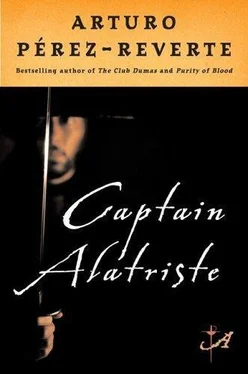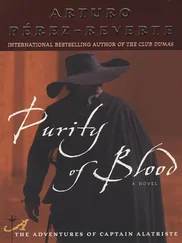Arturo Perez-Reverte - Captain Alatriste
Здесь есть возможность читать онлайн «Arturo Perez-Reverte - Captain Alatriste» весь текст электронной книги совершенно бесплатно (целиком полную версию без сокращений). В некоторых случаях можно слушать аудио, скачать через торрент в формате fb2 и присутствует краткое содержание. Жанр: Старинная литература, на английском языке. Описание произведения, (предисловие) а так же отзывы посетителей доступны на портале библиотеки ЛибКат.
- Название:Captain Alatriste
- Автор:
- Жанр:
- Год:неизвестен
- ISBN:нет данных
- Рейтинг книги:3 / 5. Голосов: 1
-
Избранное:Добавить в избранное
- Отзывы:
-
Ваша оценка:
- 60
- 1
- 2
- 3
- 4
- 5
Captain Alatriste: краткое содержание, описание и аннотация
Предлагаем к чтению аннотацию, описание, краткое содержание или предисловие (зависит от того, что написал сам автор книги «Captain Alatriste»). Если вы не нашли необходимую информацию о книге — напишите в комментариях, мы постараемся отыскать её.
Captain Alatriste — читать онлайн бесплатно полную книгу (весь текст) целиком
Ниже представлен текст книги, разбитый по страницам. Система сохранения места последней прочитанной страницы, позволяет с удобством читать онлайн бесплатно книгу «Captain Alatriste», без необходимости каждый раз заново искать на чём Вы остановились. Поставьте закладку, и сможете в любой момент перейти на страницу, на которой закончили чтение.
Интервал:
Закладка:
By two o'clock, Calle El Principe and the entrances to the corral were swarming with merchants, artisans, pages, students, clergy, scribes, soldiers, lackeys, squires, and ruffians who had dressed for the occasion in cape, sword, and dagger, all calling themselves caballeros and ready to clash over a place to watch the play. Added to that seething, fascinating commotion were the women, who swept into the cazuela amid a flurry of skirts, shawls, and fans, and were pinned like butterflies by the eyes of every gallant twirling his mustaches in the boxes and yard. The women, too, quarreled over their seats, and at times an official had to intervene and establish peace in the spaces reserved for them. Confrontations over someone's having slipped in without paying, and squabbles between the person who had reserved a seat and another person who claimed it frequently provoked a "How dare you?" backed with a sword, all of which demanded the presence of a magistrate and attending bailiffs.
Not even nobles were above these altercations. The Duque de Fera and Duque de Rioseco, disputing the favors of an actress, had once knifed each other in the middle of a play; they claimed that it was over their seats. Licenciado Luis Quifiones, a timid and good man from Toledo who was a friend of Captain Alatriste's and mine, described, in one of his irreverent ballads, the ambience that lent itself to slashing and stabbing:
They come to the corral de comedias
Pouring in like rain, and soaking wet.
But if they slip in without paying,
They leave streaming blood—and wetter yet!
Strange people, we. As someone would later write, confronting danger, dueling, defying authority, gambling life or liberty are things that have always been done, in every corner of the world, whether for hunger, hatred, lust, honor, or patriotism. But to put hand to sword, or to knife another being, merely to get into a theater performance was something reserved for the Spain of my youth. When good, it was very good, but when bad, far worse than bad. It was the era of quixotic, sterile deeds that determined reason and right at the imperious tip of a sword.
As we made our way to the corral, we had to thread through groups of early arrivals, and beggars harassing everyone who passed by. Of course, half of the blind, lame, amputee, and maimed were malingerers, self-proclaimed hidalgos brought down to begging because of an unfortunate accident. You had to excuse yourself with a courteous "I'm sorry, sir, I am not carrying any money" if you did not want to be berated in a most unpleasant fashion. The manner of begging is different among different peoples. The Germans beg in a group, the French are servile, reciting orisons and pleas, the Portuguese implore with lamentations, the Italians with long tales of misfortunes and ills, and the Spanish with arrogance and threats—saucy, insolent, and impatient.
We paid a quarter-maravedi at the entrance, three maravedis at the second door, for hospital charity, and twenty maravedis for a seat on the benches. Naturally our places were occupied, although we had paid a lot for them, but not wanting to get into a scuffle with me along, the captain, Don Francisco, and the others decided that we would sit at the back, close to the mosqueteros. I was wide-eyed, taking everything in, fascinated by the people, the vendors of mead and sweetmeats, the buzz of conversations, the whirl of farthingales, skirts, and petticoats in the women's galleries, the elegance of the well-to-do visible at the windows of their boxes. It was said that the king himself often sat there, incognito, when the play was to his taste. And the presence that afternoon of members of the royal guard on the stairs, not wearing uniforms but looking as if they were on duty, seemed to hint at that possibility.
We kept our eyes on the boxes, hoping to discover our young monarch there, or the queen, but we did not recognize any of the aristocratic faces that occasionally peered from between the lattices. The person we did see, however, was Lope himself, whom the public loudly applauded. We also glimpsed the Conde de Guadalmedina, accompanied by some friends and ladies, and Alvaro de la Marca, who responded with a courteous smile as Captain Alatriste touched the brim of his hat in greeting.
Some friends offered Don Francisco de Quevedo a place on a bench, and he excused himself and went to join them. Juan Vicuna and Licenciado Calzas were some distance away, discussing the work we were going to see, which Calzas had enjoyed years before at its first performance. As for Diego Alatriste, he was with me, having made a place for me on the barrier separating us from the open yard, so I could see without obstacle. He had bought fried bread with cinnamon and honey that I was crunching with delight, and had a hand on my shoulder to prevent me from being jostled off my place on the barrier. Suddenly I felt his grip tighten, and he slowly withdrew his hand and rested it on the pommel of his sword.
I followed the direction of his eyes, which had turned steely gray, and among the crowd made out the two men who had been lounging about on the steps of San Felipe the day before. They were standing in the pack of mos queteros and I thought I saw them exchange some kind of sign with two other men who had taken up positions not too far away. The hats tilted to one side, the folded capes, the long curled mustaches and beards, a scar or two, and their way of cutting their eyes from side to side and standing with their legs planted firmly apart were sure signs of men acquainted with a knife. The corral was filled with such men, it is true, but those four seemed singularly interested in us.
I heard the thumps that signaled the start of the come dia, the mosqueteros shouted "Sombreros!" and then all doffed their hats. The curtain was drawn, and my attention flew like metal to magnet from the ruffians to the stage, where the characters of dona Laura and Urbana, both wearing cloaks, were entering. In front of the backdrop, a small pasteboard construction represented the Torre del Oro.
"Famous is El Arenal."
“ I must say I find you light."
"In my view, there cannot be In all the world a finer sight."
I still get a thrill when I remember those lines, the first I ever heard on the stage of a corral, and I remember even more clearly because the actress who played dona Laura was the very beautiful Maria de Castro, who was later to fill a certain space in the lives of Captain Alatriste and me. But that day in El Principe, she was the beautiful Laura, who accompanies her uncle Urbana to the port of Seville, where the galleys are about to set sail, and where, by chance, she meets Don Lope, and Toledo, his servant.
"I must make haste, my ship sails
Just following the ebb. Ah, what victory it is to flee
A scheming woman's web!"
Everything around me vanished; I was completely absorbed in the words coming from the mouths of the actors. Within minutes I was transported to El Arenal, madly in love with Laura, and wishing I had the gallantry of Captains Fajardo and Castellanos, and that I were the one crossing swords with the bailiffs and catchpoles before sailing off in the king's Armada, saying, as Don Lope does,
"I had to call upon my sword.
To honor an hidalgo who
Insults me, I must draw my sword;
A point of honor, it is true,
A code we have both lived since birth.
To refuse to duel a man who vents
His anger against you, even
A lunatic, if he gives offense,
Читать дальшеИнтервал:
Закладка:
Похожие книги на «Captain Alatriste»
Представляем Вашему вниманию похожие книги на «Captain Alatriste» списком для выбора. Мы отобрали схожую по названию и смыслу литературу в надежде предоставить читателям больше вариантов отыскать новые, интересные, ещё непрочитанные произведения.
Обсуждение, отзывы о книге «Captain Alatriste» и просто собственные мнения читателей. Оставьте ваши комментарии, напишите, что Вы думаете о произведении, его смысле или главных героях. Укажите что конкретно понравилось, а что нет, и почему Вы так считаете.










